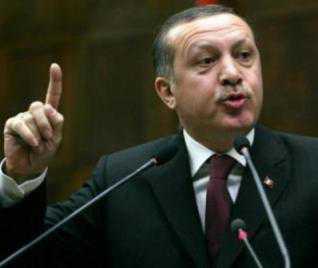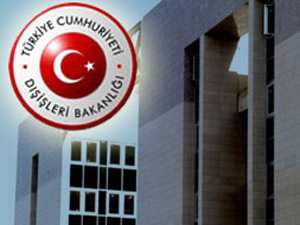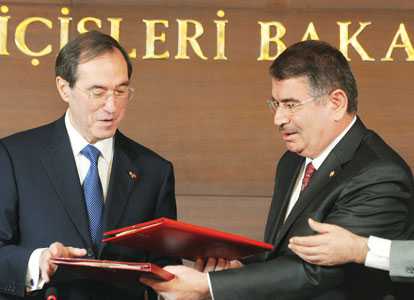Cry havoc! – and let loose the frigates of war
The ante is being upped in the Eastern Mediterranean as the crisis south of Cyprus bubbles along. Turkish news outlet Today’s Zaman reports that on Monday, the Turkish government announced a deployment of special forces along with the four frigates and naval helicopters maintaining a “security” presence in the undersea drilling area off Cyprus’ southern coast. The special forces include a Special Underwater Defense Unit and a Special Underwater Attack Unit.
Reporting the deployment of the Underwater Attack Unit is obviously a political move. The unit has quite probably been deployed as indicated, but pointing out that it’s there can only have a political purpose. Announcing that your special forces are coming is not generally the prelude to deniable covert action.
The Erdogan government is probably increasing its force profile in order to establish a posture for bargaining. That doesn’t mean that the Turks aren’t serious, or that they wouldn’t take military action; they’re not bluffing. I do think they believe, however, that the EU will blink first.
What’s the US doing?
This may be because they appear to believe the US will intervene on their behalf in the coming days. According to the government-friendly Today’s Zaman, an elaborate interlocking quid pro quo is being set up in which the Turkish government offloads its interest in a Turkish-Russian natural gas pipeline (the one known as “South Stream”) to private companies, and the US supports Turkey’s oil/gas claims in EASTMED.
The US has long preferred the EU-backed “Nabucco” pipeline over South Stream, for moving gas from Central Asia to Europe. Throughout the last decade, however, Russia maneuvered to inhibit progress on Nabucco (yes, named after the Verdi opera) by co-opting one potential participant after another. (In one last-ditch effort, Russia’s Gazprom averted an Azerbaijani commitment to Nabucco by the simple expedient of buying up all the gas Baku was selling.)
Here is Today’s Zaman (emphasis added):
The [Nabucco] pipeline will also help improve relations with the US by lessening Russia’s influence in the region. Turkey reportedly expects to gain US support to be part of the natural gas and oil exploration process by Israel and Greece in the eastern Mediterranean, which Turkey also has rights to through the Turkish Republic of Northern Cyprus’ (KKTC) presence in the area.
It is not exactly looking in the rearview mirror for the US administration to prioritize wining support for Nabucco, and reducing Turkey’s stake in South Stream. But it’s close. It’s worth noting at the outset that for Turkey, consigning her interest in South Stream to private companies is not the same thing as divorcing herself from the project. It’s merely putting Turkish participation in a different context, one that seems more meaningful to the US government than to Turkey’s.
But the importance of the whole “Nabucco versus South Stream” dynamic has receded significantly, with, first of all, the emergence of both of them as funded, viable projects, and second, with the Arab Spring and the increasing Islamization and activism of Turkey under a neo-Ottoman regime. Seeing Turkey’s participation in these pipelines as a prize to be won is yesterday’s strategic factor: it has been overtaken by events. Turkey has already agreed to participate in both. Let her.
Given Turkey’s increased saber-rattling, Russia is likely to slow down on the Turkish segment of South Stream anyway. Turkey is upping the ante on South Stream by forcing Russia to renegotiate the sale of gas to Turkey. The Russians and Turks are both masters of the art of negotiating to retain leverage and slow things down, as opposed to negotiating to get things done. Meanwhile, the North Stream pipeline into Germany has a more promising financial future in the next decade.
Russia is concerned about Erdogan’s behavior, and is cultivating friendships on the other side of Turkey in EASTMED. A Russia-Turkey cabal is not our greatest worry today. IfToday’s Zaman is right about the quid pro quo here, the Obama administration is spending too much to buy something worth very little.
A bad solution, way overpriced
The price is too high in part because it will be a triumph for Turkey’s saber-rattling if she gets what she has wanted all along: a veto over oil-and-gas activities in EASTMED. (The other part is the encouragement such an outcome would be for Turkey’s stated intention to ramp up her naval posture in the region. More Turkish warships and aircraft patrolling EASTMED on a routine basis is not a stabilizing development.)
I’ve been predicting that what Turkey wants is a multilateral mechanism in which she can exercise the veto she craves. As the situation is developing now, Cyprus and Israel, having agreed on a maritime delineation of their Economic Exclusion Zones, are proceeding – quite properly, by the terms of international law – without reference to Turkey. Turkey doesn’t want to start a war: she wants to leverage military threats to create a need for bargaining, and for a multilateral decision-making body in which she will participate. Through such a body, Turkey would get a seat at the table for matters she has no natural right to exercise a veto over, and she could ultimately prevent everything except what she wants to do.
If the US goes through with the diplomatic effort suggested by the Today’s Zaman article, and if the gambit succeeds, Erdogan will have achieved his goal, and the US government will have been his path of least resistance. There is also the possibility of not succeeding; e.g., if we assume that the emerging gambit is opposed by Russia, the major nations of the EU, and Israel. A diplomatic black eye for the US would be the least of the evils here, but the entire situation has a shabby, regrettable character; the US figures in it not as a superpower and arbiter, but as a target for diplomatic exploitation.
La France Surcouf
As the Obama administration practices leading from behind, others are polishing up their leading-from-the-front skills. Greek news sources report that France is dispatching her own frigate, FS D’Estienne d’Orves, to patrol the afflicted area off Cyprus. A caveat must be entered on this: D’Estienne d’Orves will apparently not conduct a dedicated patrol in EASTMED; she will be heading for antipiracy operations in the Indian Ocean, and stopping for a show of maritime presence along the way.
That said, if Greek commentators are overstating the import of the frigate’s activities en route, it is only in a tactical sense. In a strategic sense, France is on the move, and whatever her navy does will take on greater significance in the coming days. There has been no question that France played the leading political and geostrategic role in the NATO operation in Libya, a reality affirmed with the state visit to Libya of Nicolas Sarkozy, along with David Cameron, in September, and a growing taste in Europe for military photo ops like this one.
(As an aside, a recent report suggests that the main US contribution to the Libya operation – reconnaissance and surveillance – was largely disdained by the French pilots who have made up most of the air attack force. The pilots’ complaint is that it takes too long for the video/imagery intelligence from US assets to be processed through the NATO command center in Italy, so they have frequently operated without it. This is a particularly interesting indicator of the light political governor on NATO operations in Libya; in other operations, the concern about collateral damage and mistargeting has been too great for the participating forces to consider dispensing with synoptic intelligence. Indeed, the targeting process in other operations has often been delayed by the need for strike approval at the highest echelons for the most minor tactical targets. The apparent absence of this decision-making regime in the Libya operation is noteworthy.)
In just the last couple of days, France has announced her intention of establishing relations with the national council being formed by the Syrian opposition – another preemptive diplomatic action, and an interesting one in light of Turkey’s patent interest in the future of Syria, and the dust-up in the last few days over a call by Sarkozy for Turkey to acknowledge the slaughter of Armenians in World War I as a genocide. Turkish news daily Hurriyet speculates on the return of a Franco-Turkish rivalry, like that which manifested itself after World War I in – naturally – Syria.
Britain may no longer have the view she once did of the strategic importance of EASTMED, but France has always had a view of her own – and today she has one of the biggest, best-equipped navies in the region. Sarkozy has been criticized by French traditionalists for an uninspired foreign policy; he may or may not be responding to the complaints of the “Groupe Surcouf,” which posted a letter in February 2011, when the Libya crisis was spinning up, lamenting that “the voice of France has disappeared from the world.”
(The group is named after France’s famous “submarine-cruiser,” a big, heavy-gunned ship built to be capable of submerging, during the years of the Washington Naval Treaty of 1922, because the treaty did not impose limits on the size of a submarine. Surcouf was a quintessentially French blow for ingenious French independence from France’s commitments to collective security arrangements. If you can’t love France, you can’t love anything.)
French submarine-cruiser Surcouf; Wikimedia Commons
Sarkozy may simply see the need for a counterweight to the injudicious US policy toward Turkey. The Turks aren’t the only ones who detect some big quos being handed out from Washington for their quids. Besides beefing up Turkey’s force of AH-1W Super Cobras, which are being used for the ground operations against the Kurdish separatists in Eastern Turkey, the US is reportedly selling armed drones to Turkey (something we have, to date, sold only to the UK). The quid from Turkey in this case is the agreement to host the X-band radar for the NATO missile defense system, something we didn’t actually need Turkey for, as Bulgaria was anxious to host it. Hosting it in Turkey will create difficulties in the matter of sharing radar data with Israel – which is currently routine, since Israel also hosts an X-band radar and is linked in to the NATO data system.
Negotiate or we’ll shoot
The US approach to Turkey comes off as unwarrantedly enthusiastic and indiscriminate right now. The concerns about Turkey are obvious to everyone in the region, yet US policy is to court and gratify Erdogan’s activism. Whatever the EU’s rarefied stance, the nationsof Europe will not join us in that burbling enthusiasm, and will find it natural instead to make common cause with a more wary Russia. For our ally Israel it creates a separate but related set of concerns. Israel too must lose no time in brushing up her alternatives, especially given the geographic importance of Syria to all the various EASTMED issues, including Israel’s own security.
It is both good news and bad news that when there is a power vacuum in Europe and the Med, rhetoric and posturing multiply far faster than actual armed encounters. The good news is that shooting is likely to be postponed. The bad news, however, is that while we congratulate ourselves on the good news, power relationships will be changing materially. If Turkey succeeds, by making threats, in getting a veto she has no right to over the economic activities of others, everything will have already changed.
J.E. Dyer’s articles have appeared at Hot Air’s Green Room, Commentary’s “contentions,”Patheos, and The Weekly Standard online.







